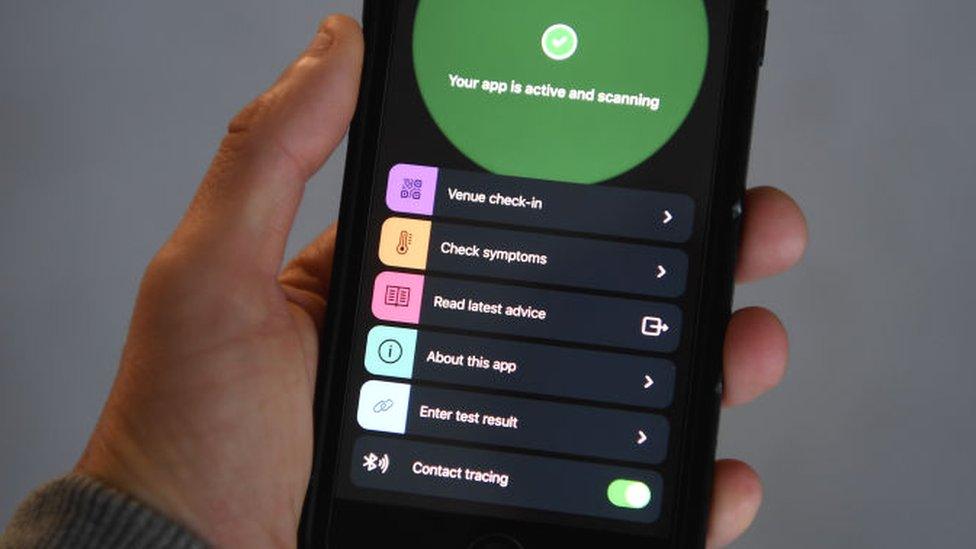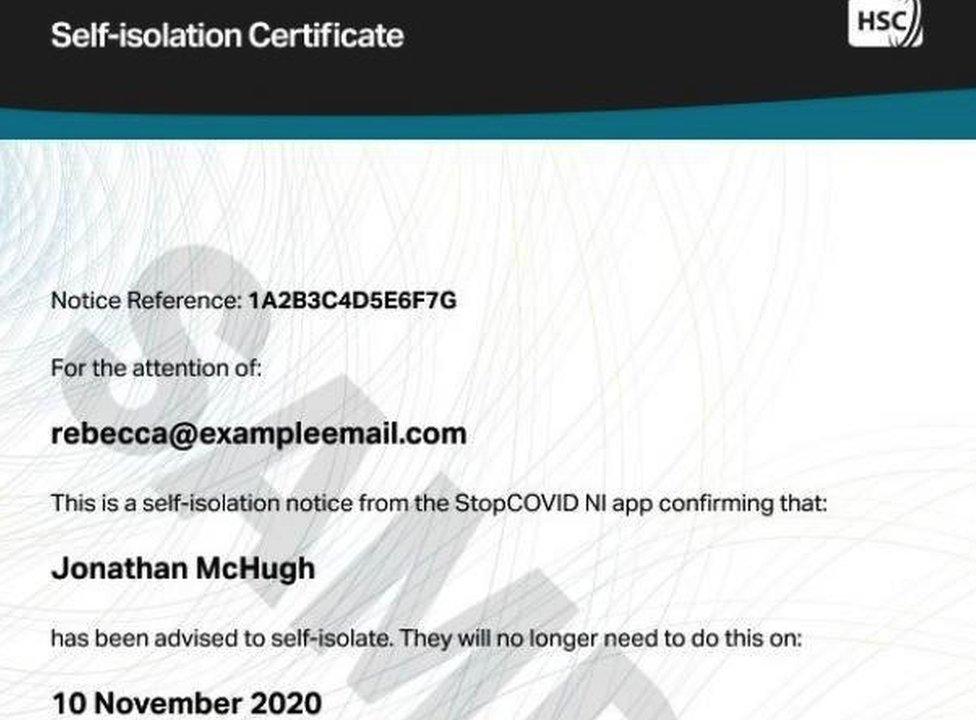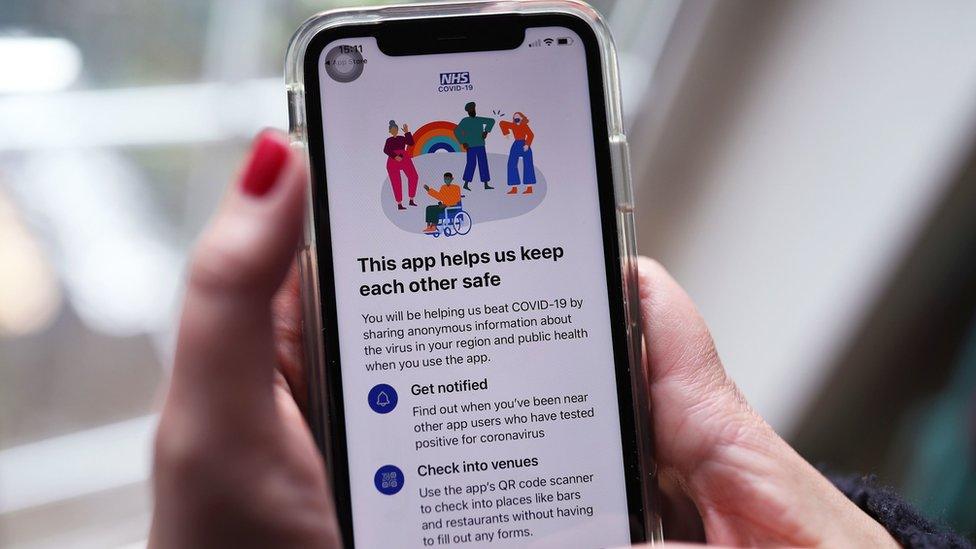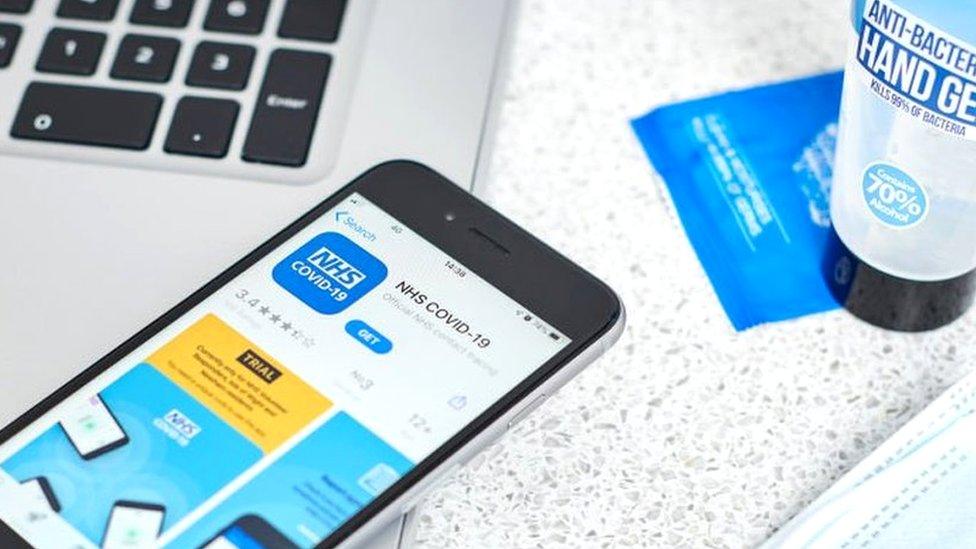Coronavirus: NHS Covid-19 app starts offering self-isolate payments
- Published
- comments

An update to England and Wales's NHS Covid-19 contact-tracing app is adding a way to apply for a £500 grant if it gives a self-isolation order.
Until now, those on low incomes were only offered the payment if they had been told to stay at home by human Test and Trace operators.
The move comes at a time when the number of people testing positive for the coronavirus is on the rise again, external.
Experts have suggested following the app's guidance could help reverse that.
"People are not isolating because they can't afford to or because they don't realise that they have to - the whole system is not working," Paul Hunter, professor of health protection at the University of East Anglia, told BBC Radio 4's Today programme.
"I think there is ample evidence that many people who should be isolating don't feel they can for whatever reason, and I think that has to be fixed if this is going to be effectively controlled until we've had adequate rollout of the vaccine."
New figures reveal that the NHS Covid-19 app has been downloaded 20,361,253 times as of 2 December, external, representing about 40% of eligible adults.
That only represents a 0.7% gain since the previous week, suggesting that installations have plateaued.
But by offering financial support, more people might be willing to use it.
And that in turn would help the system become more effective at identifying those at high risk of being infected by someone they were recently in close proximity to.
However, officials say the key aim is to encourage and make it easier for more people to self-isolate.
Preserving anonymity
England and Wales have both allowed people on low incomes, who cannot work from home, to apply for financial help if they have received a phone call, email, letter or text message telling them to self-isolate.
Previously, that did not cover people who had received the app notification to isolate.
This was in part because the app is designed to keep the identity of anyone receiving an alert private.
So, the challenge was to find a way to add the facility while still being able to prevent fraudulent claims.
The solution involves a new financial support button that only appears on the app's home screen if the user has been told to self-isolate.
If tapped, the user is taken out of the app to a webpage that asks them to select if they live in England or Wales.
In the case of England, they will then need to fill in an eligibility criteria check.
If accepted, they are next asked to supply their email address and phone number to get a security code to register with NHS Test and Trace.
The NHS Test and Trace team then provides an account number that the user supplies to their local authority to get the payment.
In doing so, the user must reveal their identity and accept a legal obligation to stay at home for the duration of the order.
If they then break the self-isolation rules they can be fined £1,000 or more, external.
Wales's NHS Test, Trace, Protect service has a parallel system, which first asks users which of the country's 22 local authorities they live in.
Each council has its own claims process, which must then be completed.
The system has been set up in such a way that the process only works once, and the external webpage checks it has been accessed in an authorised way via use of a token.
All data stored within the app, including locations checked in via QR barcode scans, remains anonymous to the authorities.
Northern Ireland's StopCovid NI app recently deployed a similar solution, external, generating a Self-Isolation Certificate that can be used to apply for a grant from its Department for Communities.

But at this point, the NHS Scotland Protect Scotland app lacks a similar facility to let users apply for help from the Scottish Welfare Fund, external.
"Currently we are not able to provide direct eligibility from an app-only request to isolate as it maintains the anonymity of the user so we cannot confirm that the applicant is the person who has been contacted," said a spokeswoman for the Scottish government.
"We are looking at possible solutions if a user chooses to be identified when asked to isolate.
"In the meantime, local authorities are being flexible and looking further into the individual circumstances of these types of applications on a case by case basis to determine whether the request to isolate can be verified by other means and an award made."
Related topics
- Published30 November 2020
- Published22 November 2020

- Published2 December 2020
